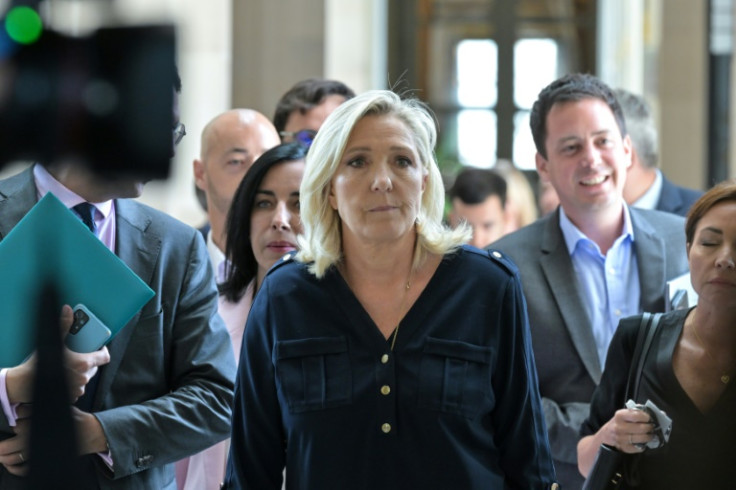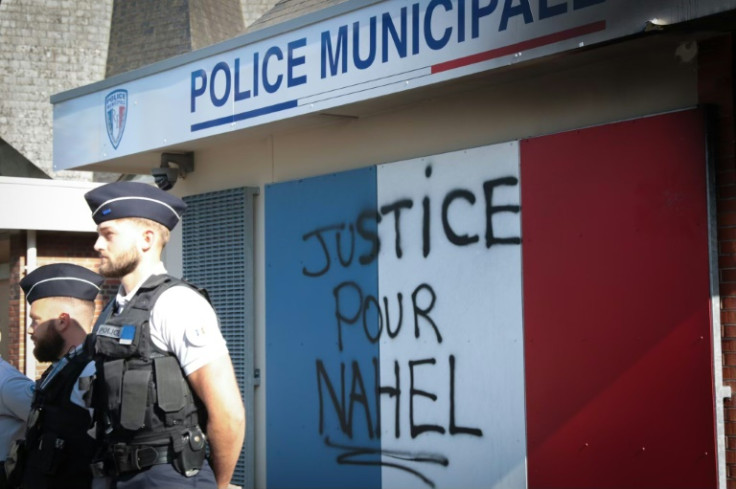Will France's Riots Benefit Far-right Le Pen?

In her first speech in parliament as France's riots ebbed this week, far-right leader Marine Le Pen accused the government of turning the country into a "hell" that she had foreseen.
"The reality is that you didn't want to hear any of the warnings," said the 54-year-old, whose 89 MPs form the biggest opposition party in parliament since elections last year.
"We predicted what is happening despite great adversity. Unfortunately we were right."
She and her father Jean-Marie have been forecasting France's demise and even civil war since the 1970s in doom-laden speeches focused on the presence of foreigners in France.
"Above all and before anything else, we need to stop anarchic immigration," Le Pen continued.
The political fall-out from France's worst urban violence since 2005 remains highly uncertain, leading to speculation about who stands to gain from the breakdown in law and order that has shocked millions of French people.
Le Pen and many others on the right have sought to blame the mass looting and clashes on immigrant-origin communities, mostly from former French colonies in Africa, who have settled in suburban areas in towns and cities since the 1960s.
Despite the riots being sparked by allegations of police brutality and racism after the fatal shooting of Nahel M. -- a 17-year-old boy of Algerian origin in Paris -- many analysts feel the far-right promise of a radical crackdown on crime and immigration could find new takers.
"I think we'll see a rise of several points for the National Rally in an extension of the quite incredible gains they've made over the last few years," Olivier Babeau, co-founder of the right-leaning Institute Sapiens think-tank, told AFP.
"Without them really doing or saying much, events are helping them convince part of the population," he added.
Le Pen achieved her highest-ever score in last year's presidential elections -- 41.5 percent in the second round --- and then celebrated record parliamentary election results two months later.
Jean-Yves Camus, a far-right specialist at the Jean Jaures Foundation, agreed that Le Pen and the even more radical anti-Islam politician Eric Zemmour looked the most likely to gain from the riots.
"There's a risk that Eric Zemmour and Marine Le Pen benefit from the situation, notably during the European elections which will take place next year," he told AFP.
The government has sought to counter the narrative being pushed by the far-right and in the mainstream Republicans party that immigrants were to blame for the unrest, which saw 273 buildings belonging to the security forces and 168 schools damaged.
Interior Minister Gerald Darmanin said that 90 percent of the roughly 3,500 people arrested during the five nights of the most severe rioting were French nationals.
"Yes, there were some who could be from immigrant backgrounds," Darmanin, who has Algerian roots, said of the lists of names of detainees he had seen while touring police stations.
"But there were a lot of Kevins and Matteos too," he told a hearing in the Senate on Wednesday.
"This identity-based analysis seems wrong to me," he said, while acknowledging that the question of how best to integrate immigrants was "interesting."
Camus believes that the government might be credited by some voters for having brought the unrest under control in under a week thanks to a massive deployment of up to 45,000 security forces at their peak.
The last nation-wide riots in 2005 lasted for nearly three weeks and led the government to resort to a state of emergency.
"Without having to use a state of emergency and with a strategy of responding gradually, the government demonstrated that it was able to contain the movement," he told AFP.
President Emmanuel Macron has condemned the "inexcusable" police shooting which sparked the riots, which saw an officer open fire at point-blank range having stopped a 17-year-old driving a Mercedes without a licence in a west Paris suburb.
The centrist head of state has promised a response, but major police reform -- called for by the left -- remains off the table.
Macron has so far focused on how to punish parents whose children commit crimes amid shock about the young ages of many of the rioters.
The country's leftist alliance is also at odds, with the head of the radical France Unbowed party Jean-Luc Melenchon creating rifts with his Socialist and Communist allies by failing to unequivocally call for calm.
He has suggested the riots were "poor people rebelling."
Left-leaning Le Monde newspaper sharply criticised him in an editorial, saying that he was "at odds with a very strong demand for a return to order which is rising in public opinion."
"In a country shocked by five days of urban riots, the left is not reassuring," it said on Thursday.


© Copyright AFP 2024. All rights reserved.





















